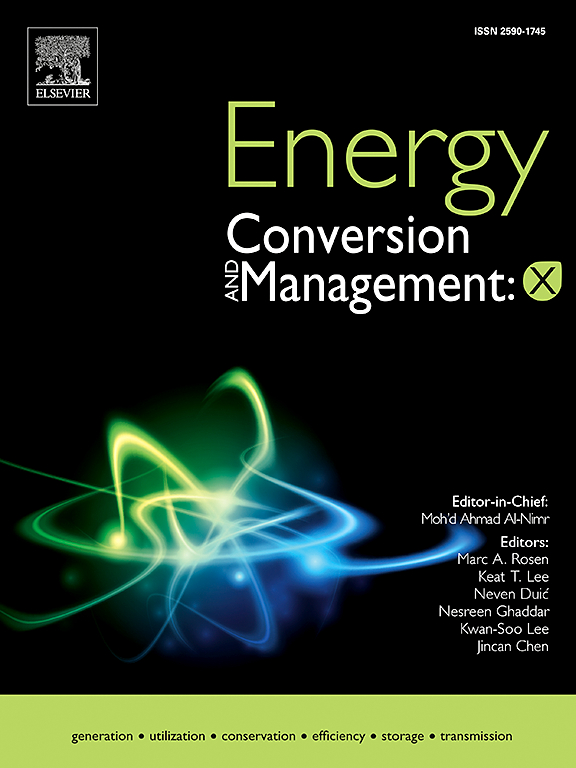提高冷库效率:利用战略性传感器输入数据进行能源优化的连续深度确定性策略梯度方法
IF 7.1
Q1 ENERGY & FUELS
引用次数: 0
摘要
在这项研究中,我们提出了一种基于连续深度确定性策略梯度(DDPG)的控制算法,应用于扩展规模的冷库环境,以优化能源效率。这项研究的一个关键创新之处在于使用了位置合理的温度传感器,特别是放置在机组冷却器附近的传感器,这使得算法能够快速响应温度波动,包括除霜周期等异常情况。先前为小型设施优化的基础框架、奖励功能和数据通信方法进行了调整,以适应扩展冷库设置的要求。与单个温度传感器的小型设施不同,扩展设置包含20个策略性放置的传感器,可以深入研究传感器位置如何影响算法性能和有效性。该算法将实时数据驱动学习与鲁棒控制策略相结合,在冷库能源管理领域取得了重大进展。因此,实验结果表明,与传统方法相比,在保持- 10°C稳定目标温度的情况下,能耗显著降低19.8%。本研究不仅突出了基于人工智能的控制算法在现实设施中的实际可行性,而且强调了传感器定位在提高算法性能和节能方面的重要性。在保持目标温度的同时实现大量节能的能力突出了这种先进控制方法在实际应用中的潜力。本文章由计算机程序翻译,如有差异,请以英文原文为准。

Enhancing cold storage efficiency: Continuous deep deterministic policy gradient approach to energy optimization utilizing strategic sensor input data
In this study, we present a continuous Deep Deterministic Policy Gradient (DDPG)-based control algorithm applied to extended-scale cold storage environments to optimize energy efficiency. A key innovation of this study is the use of strategically positioned temperature sensors, particularly sensors placed near the unit cooler, which enabled the algorithm to respond rapidly to temperature fluctuations, including abnormal conditions such as defrost cycles. The foundational framework, reward function, and data communication methods, previously optimized for small-scale facilities, were adjusted to suit the requirements of the extended cold storage settings. Unlike small-scale facilities with a single temperature sensor, the extended setup incorporated 20 strategically placed sensors, enabling an in-depth investigation into how sensor location influences algorithm performance and effectiveness. The proposed algorithm represents a significant advancement in the field of energy management for cold storage, combining real-time data-driven learning with robust control strategies. Therefore, Experimental results demonstrate a remarkable 19.8 % reduction in energy consumption compared to conventional methods while maintaining a stable target temperature of −10 °C. This study not only highlights the practical feasibility of AI-based control algorithms in real-world facilities but also emphasizes the significance of sensor location in enhancing algorithm performance and energy savings. The ability to achieve substantial energy savings while maintaining the target temperature highlights the potential of this advanced control method in actual practical applications.
求助全文
通过发布文献求助,成功后即可免费获取论文全文。
去求助
来源期刊

Energy Conversion and Management-X
Multiple-
CiteScore
8.80
自引率
3.20%
发文量
180
审稿时长
58 days
期刊介绍:
Energy Conversion and Management: X is the open access extension of the reputable journal Energy Conversion and Management, serving as a platform for interdisciplinary research on a wide array of critical energy subjects. The journal is dedicated to publishing original contributions and in-depth technical review articles that present groundbreaking research on topics spanning energy generation, utilization, conversion, storage, transmission, conservation, management, and sustainability.
The scope of Energy Conversion and Management: X encompasses various forms of energy, including mechanical, thermal, nuclear, chemical, electromagnetic, magnetic, and electric energy. It addresses all known energy resources, highlighting both conventional sources like fossil fuels and nuclear power, as well as renewable resources such as solar, biomass, hydro, wind, geothermal, and ocean energy.
 求助内容:
求助内容: 应助结果提醒方式:
应助结果提醒方式:


